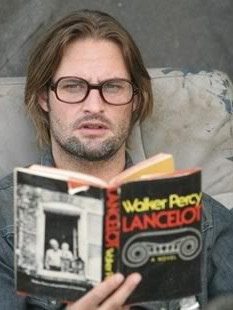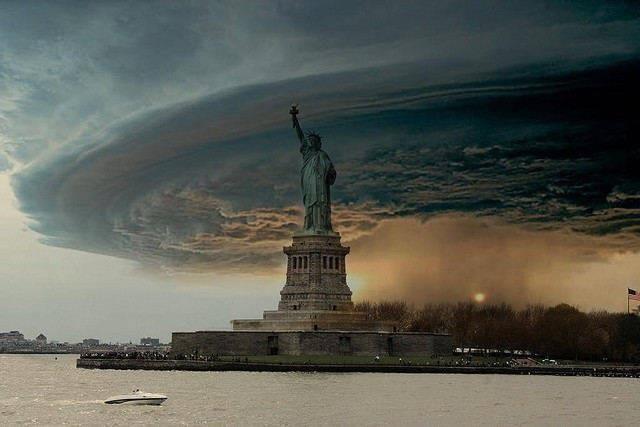“The hurricane blew away the sad, noxious particles which befoul the sorrowful old Eastern sky and Midge no longer felt obliged to keep her face stiff. They were able to talk. It was best of all when the hurricane’s eye came with its so-called ominous stillness. It was not ominous. Everything was yellow and still and charged up with value.”
— The Last Gentleman, Walker Percy
Sandy was undoubtedly a very bad thing, but our anticipation and witness of the hurricane was a perversely happy event. It could well be that I’m only an immature teenager who delights in destruction, and that no one will relate to these thoughts, so, to separate the sane from the mad, have a quick quiz:
1. When you heard about the coming hurricane, you were:
a) Worried and depressed.
b) Excited and oddly elated.
2. When you heard that it was not one storm but three, you were:
a) Even more worried and depressed.
b) Even more elated, prone to staring out of windows.
3. When you looked up the projections for the hurricane’s path, you found yourself:
a) Thanking God (or Nothing) that your home wasn’t in its path.
b) Perversely wishing your home was at least a little in the hurricane’s path.
4. When you heard that the storm was being called ‘Frankenstorm’, the hurricane became:
a) More monstrous and terrifying.
b) Awesome.
5. When the hurricane came and all it seemed like was a little rain, you were:
a) Grateful.
b) Disappointed.
6. When the hurricane came and knocked over trees and turned the power off, you were (initially):
a) Sad.
b) Happy.
If you answered “b” to any of these questions, you are odd. Don’t feel too bad: While shamelessly lording over a hurricane tracker, I attempted to click and drag the hurricane image closer to my location on the map, before realizing my gross overestimation of the Internet. (I would hardly expect any one in the New York area to answer “b” easily, as any perverse happiness they might taken in the oncoming day of wrath has been checked and countered by the massive inconvenience of evacuation, the real, tangible fear for the safety of loved ones, sobered by the reality of lives lost and homes destroyed. Know that my prayers are with you.)

As for the rest of us awful, terrible people: Though I can’t give a mathematical reason for our gleeful grin in the face of destruction, I’ll at least give a partial answer, an answer constructed by the late great novelist Walker Percy.
It goes like this: We denizens of the Scientific Age know that “the organism is needy or not needy accordingly as needs are satisfied or not satisfied by its environment”. We also know that humans are merely intelligent animals, and that we occupy no special moral or spiritual realm. The same truth applied to the organism should apply to us: No matter how complex our needs may be, if we have all our needs fulfilled, then we — like bunnies with food, shelter, and a mate — should be happy. If our environment is a good one, we are content. If our environment is a bad one, we are not.
Thus the “self sees its only recourse as an endless round of work, diversion, and consumption of goods and services”. That is to say, the modern, scientific-aged American concerns himself entirely with the constant maintenance of a good environment. Despite this, and even despite actually achieving this good environment, he still feels lonely, isolated, and oppressed by some “thing”, some malaise that he can’t shake. This is the age of anti-depressant drugs and therapy, of elderly suicide and bored twenty-three year-olds. This is an age of dissatisfaction, despite every conceivable form of entertainment, knowledge, pleasure, convenience, and the fact that most Americans meet the quintessential demand of any good, American environment — they go to church.
Odd, isn’t it? The self “has come to see itself as an organism in an environment and so can’t understand why it feels so bad in the best of all possible environments — say, a good family and a good home in a good neighborhood in East Orange on a fine Wednesday afternoon – and so finds itself secretly relishing bad news, assassinations, plane crashes, and the misfortunes of neighbors, and even comes secretly to hope for catastrophe, earthquake, hurricane, wars, apocalypse — anything to break out of the iron grip of immanence.” (Lost in the Cosmos)
The hurricane relieves us. The things we seek to fend off despair with, the things we secretly doubt have any ability to bring us happiness, all of these are decimated in the face of the Frankenstorm. What does your money matter, when there is a whirlpool of destruction bearing down on rich and poor alike? What does your college education matter — certainly supposed to bring you happiness — when the ice giants are uprooting trees? What does your neighborhood and your good school system matter, your wardrobe, your iPhone, your car, your savings, your humanistic outlook, your eternal politeness? Hurricane, dammit!
There is a reason we can’t help but think of The Last Judgment when the iron clouds descend on us. It’s not that both God and the Hurricane are sublime and scary, but that they are both honest. You are only yourself in a hurricane — the winds aren’t concerned with your successful career. We are made happy because, stripped of caring about good environment and the constant upkeep of happiness-making externals, we experience ourselves. We confront the self, the thing that matters. To a greater or lesser to degree we our forced to simply be human, and — for but a moment — we are confirmed in our suspicions: Happiness is not found in our environment. We laugh while discussing the coming destruction, not as men-from-good-families or women-with-degrees, but as ourselves in a hurricane. We feel like little kids again — but what is a little kid except a being who is totally himself, without adult pretensions, safeguards, and abstractions? “Terrible things are happening, people are getting killed, you’re liable to get killed, there is a certain exhiliration. It comes from a peculiar sense of self…”
We feel small and naked and happy, not because we the hurricane is big, but because at the final count we are small and naked, and that’s the happy thought the hurricane reveals. Given that we are happy when all our supposed needs are rendered unimportant, it seems to follow that no combination of need-fulfillment will ever render us truly happy. We are not simply intelligent animals. We are a perverse race. We do not belong. For myself, given that this existence is intolerable and this world is vale of tears, it is good to know I do not belong.
“Hurricanes, which are very bad things, somehow neutralize the other bad thing which has no name.”
— Walker Percy, Lancelot
If you are able to, give alms to those aiding the victims of Hurricane Sandy in Haiti and the Dominican Republic.
















